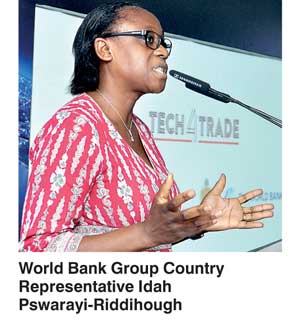Tuesday Feb 17, 2026
Tuesday Feb 17, 2026
Tuesday, 31 October 2017 00:00 - - {{hitsCtrl.values.hits}}
World Bank Country Director Idah Z. Pswarayi-Riddihough yesterday outlined six areas on which Sri Lanka must focus in order to carry out trade in an efficient and inclusive manner to improve its overall competitiveness in reaching out to global markets.
“Opening up borders alone is not enough. It is critical to ensure that trade is carried out in an efficient and inclusive manner. I hope this is not yet another dream but a reality we are all involved in creating,” she said at the ‘Tech4Trade’ forum organised by the Australian High Commission in partnership with the Ceylon Chamber of Commerce (CCC) yesterday.
The Country Director’s six areas of focus were creating an investment-friendly environment, reducing trade transaction costs, reducing the number of institutions interacting with traders, using technology to promote transparency and efficiency in the business environment, creating a National Single Trade Window and changing the institutional culture. She highlighted the importance of creating a National Single Trade Window to allow all parties involved in trade and transport to lodge standardised documentation and information at a single point of entry for import, export and transit-related regulatory requirements.
As work is being carried out to develop the requisite blueprint of the National Single Trade Window, she believes it will be ready by May 2018. A recent assessment by the World Bank team revealed that at least 22 agencies were involved in issuing regulations and approvals related to trade, while another study by the Department of Commerce identified 34 agencies involved in publishing regulations that affect trade.
“In the case of Sri Lanka, streamlined processes for the Board and non-Board of Investment companies, updated customs’ ordinances and clear, transparent border management will significantly boost investor confidence,” she stressed.
It was pointed out that according to the Logistics Performance Index, in 2014 the average cost to export from Sri Lanka was $ 579 whereas in Vietnam this was about $ 237, while in Thailand it cost $ 250. Similarly, the average time to export in Sri Lanka was two days whereas in Thailand and Vietnam it took only one day.
Emphasising that institutional culture mattered, she asserted that technology was only as good as the people who used and managed it. “All these points I have mentioned will require institutional behavioural changes; many that will challenge the status quo for doing business, even the skills required to operate in this new environment. Hanging on to the way things were done before, even with new technology, will only go so far. This is where many good ideas die unless the culture changes.” Further, she said there was no substitute to formalising new agreements to increase the sharing of data amongst government agencies and the private sector, honouring signed agreements to standardise and streamline data requirements and retraining staff. “This is the hard part and it will require a strong commitment from the Government and development partners,” she added.
While commending the establishment of a National Trade Facilitation Committee, Pswarayi-Riddihough said: “We must push ourselves to do better and I continue to expect a lot even from the World Bank and from Australia.” She also highlighted the importance of innovative Blockchain technology and said it allowed traceability in supply chains, a key ingredient in today’s consumer confidence.
“Consumers don’t only demand a variety of products but they also want to know where the products are coming from. With re-entry into GSP+ this information will be a game changer,” the Country Director added.(CdeS)